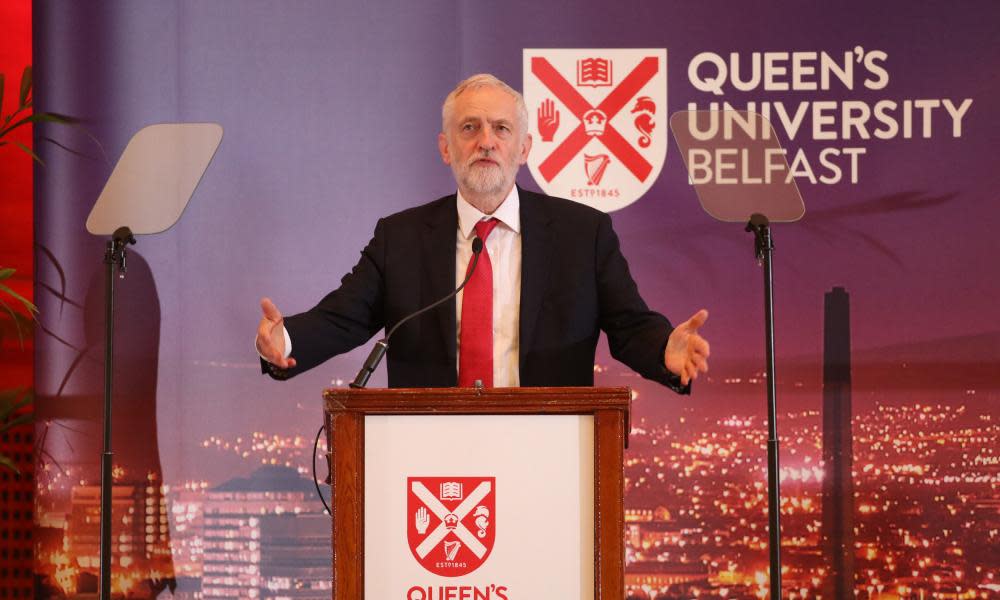In the Brexit vacuum, Corbyn’s ‘soft border’ talk can unite Ireland

The briefings ahead of Jeremy Corbyn’s speech in Northern Ireland yesterday suggested he would emphasise the popularity of the political unification of Ireland on both sides of the border. In the event, his remarks were far more measured and focused on the challenges of Brexit. Perhaps that’s no bad thing.
In the south, there is no mainstream political party that does not hold unification as an important long-term political goal. A survey by Behaviours and Attitudes for the British Council in Dublin back in 2003 showed that preference for a united Ireland among the under-40s in the Republic came out at roughly 70% across the board, regardless of whether their attitude to Britain was positive or hostile.
However, the story in Northern Ireland is very different. An Ipsos Mori poll released by Queen’s University Belfast this week found that even after Brexit just 21.1% of people in Northern Ireland say they would vote for Irish unity, including just 42.6% of Catholics. For all the talk of changing demographics – the last census found the proportion of those declaring themselves to be Protestants fell below 50%, alongside a small rise in the numbers of Catholic – an active interest in pursuing a united Ireland remains a minority sport.
Corbyn has long since framed the problem of Northern Ireland with a classic Irish republican viewpoint. As a consequence he is probably the first major UK political leader to receive unambiguous public support from Sinn Féin’s elected representatives on both sides of the border. But what makes you popular with one side doesn’t always go down well with the other. On Thursday, he took care not to transgress the consent principle enshrined in the Good Friday agreement: that is the guarantee to the people of Northern Ireland that they will have the final say in whether they remain within the United Kingdom or leave it.
The confusion surrounding Brexit has also changed things somewhat. Northern Ireland voted to remain in the EU – but Corbyn was clear with his Belfast audience that he would not reverse the referendum decision, choosing instead to commend the virtues of a soft border – a wise move sure to appeal to his audience. Another survey published this week showed that only one in every three Protestants want a hard Brexit. The Protestants of Ulster are nothing if not pragmatic. To the DUP leader, Arlene Foster – who grew up in an Anglican parish whose boundaries stop at the border, but whose parishioners are drawn from the rural populations on both sides – this pragmatism is no surprise. Protestant farmers in Fermanagh in the north send milk yields to Monaghan in the south.
While the DUP emphasises the fact that trade between Northern Ireland and Great Britain far outweighs the total of north-south trade, Foster also knows that in the sensitive areas of farming and agrifoods, the 25-year-old single market has reintegrated many of those cross-border communities. Brexit, however it is engineered – via ‘max fac’, or some form of looser integration – must maintain local access to the single market to keep the border open. The threat is not violence or insecurity (beyond the present deadlock), but economic disruption of the sort that will lead to a further economic slippage.
Could this all lead to a united Ireland? Despite the popular mood music, Brexit is unlikely to have much effect in the short term. Partly because the outcome of a soft Brexit (however that is achieved) will not be felt immediately. More relevant is the century-long failure of republicans, north and south, to reach out to their unionist neighbours to make them an offer they cannot refuse. The Good Friday agreement provides them a means of developing such an offer; and, as Corbyn has said, with sufficient will it will survive Brexit.
The southern unionist Edward Carson, speaking in the Commons in the summer of 1913, offered them this advice: “If ever you are going to bring the Ulster portion of the community into line with the rest of Ireland, you will never do it by any means except those of persuasion.”
The Brexit-inspired political vacuum in Westminster, as well as Stormont, has given rise to all manner of fantasy outcomes. We have tried conflict and it has failed. Typically, war tends towards an endpoint – victory for one side, defeat for the other. Peace is different. It isn’t meant to stop, but to deepen. People in Northern Ireland know they are not going to get exactly what they voted for, but the future is going to be different, whether they like all of it or not.
• Mick Fealty is the founding editor of www.sluggerotoole.com, a Northern Ireland political blogs

 Yahoo News
Yahoo News 
